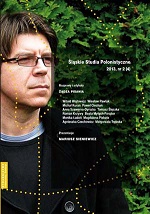Dyskursy, ekskursy, wielomówność i pobocza narracyjne. (Propozycje interpretacji miejsca dygresji w epice sarmackiej na przykładzie "Argenidy"...)
Discourses, excurses, multiple speech and narrative margins. (Propositions of interpretation of the role of digression in the Sarmatian epic...)
Author(s): Agnieszka CzechowiczSubject(s): Literary Texts
Published by: Wydawnictwo Uniwersytetu Śląskiego
Summary/Abstract: The narrative poems by Wacław Potocki show a clear tendency to interpolate the fictional structure of works via numerous digressions. The latter take on the form of selfexisting multigenre lyrical works, satirical intarsia, rhetorical monologues of characters or discourses and arguments conducted by them. The poet’s preferences for digressions and multplied reflections parallel to the main action of works, though not necessarilly depended on it, are best proved by "Argenida", "Transakcyja wojny chocimskiej" and "Nowy zaciąg". The very poems, a romance, epos and Messianic poem, are characterised by a clearly discoursive nature, which makes their fictional action seem as much a poetic form of mimesis as the author’s possibility to develop his rhetorical initiatives. This characteristic feature of poet’s narrative works, considered as a manifestation of “multiple speech” constitutes a structural quality of "Argenida", a poem being a creative translation of "Argenis", a Latin political romance by John Barclay. In this work, the presence of reflection, advice or lyrical and rhetorical excurses is connected with the quality of the adapted work as such, clearly the background one, where the fictional action permeates into the discoursive plan. The analysis of Wacław Potocki’s epic works in the light of the Polish and European early-modern literary practice allows for noticing the fact that the exposition of a digressive perspective of extra sphaeram is not a patent of a “multiple speaking” poet from Łużna, but an important and desired feature of the early-modern European narratives.
Journal: Śląskie Studia Polonistyczne
- Issue Year: 2013
- Issue No: 2 (4)
- Page Range: 193-206
- Page Count: 14
- Language: Polish

